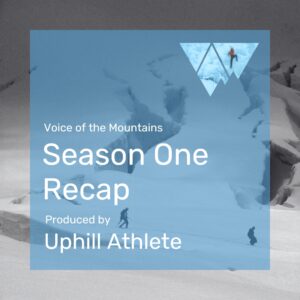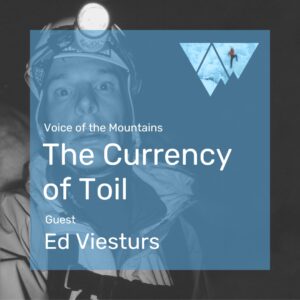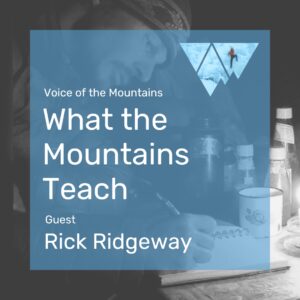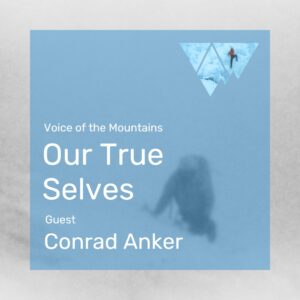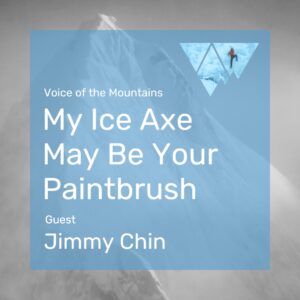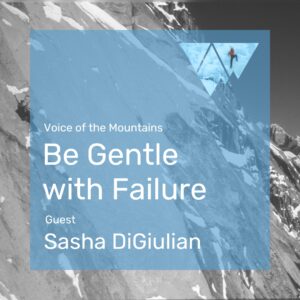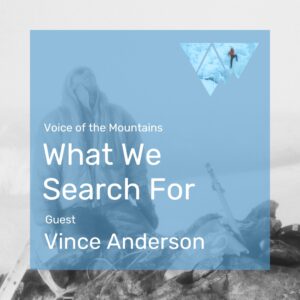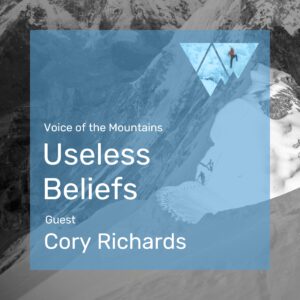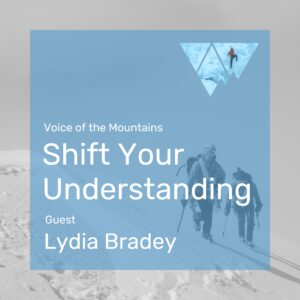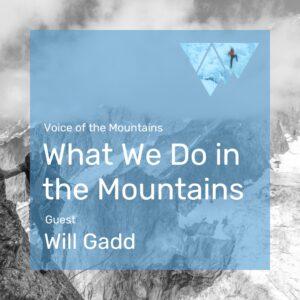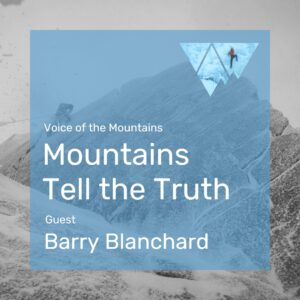Our True Selves
Guest Conrad Anker
Voice of the Mountains host Steve House welcomes renowned climber Conrad Anker on to the podcast. They discuss Conrad’s journey in mountaineering, his philosophy, and his leadership within the climbing community. They reflect on lessons learned in their own early climbing experiences, noting how climbing became a way to understand themselves and build resilience.
Conrad emphasizes the motivations behind mountaineering, contrasting reward-seeking with purpose-driven pursuits. He describes his path from climbing as a youth in the Sierra Nevada to his extensive expeditions across the world. They discuss the importance of trust and connection between climbing partners, as well as the responsibilities and ethical considerations in leadership, especially within the climbing community.
Conrad also shares insights into his work with the Khumbu Climbing Center (KCC) in Nepal, which provides education and training to Sherpa climbers. The conversation highlights Conrad’s belief in silent leadership, leading by example, supporting others, and focusing on collective success rather than personal accolades.
The two legends of climbing reflect on legacy, risk, loss, and the impact of experiencing grief in the climbing world. Tune in for an episode full of wisdom and empathy we can all learn from.
Images by Jason Thompson.
LISTEN ON:
LIKE, COMMENT, AND SHARE:
READ THE COMPANION ESSAY
Exploring the poetic soul of the mountains.
Voice of the Mountains explores the mental and emotional adventures found in discovering who we are and what we’re capable of. Here we engage in self-reflection, humility, and embrace the beauty and struggle of the alpine experience equally.
ALL EPISODES
00:00:02:04 – 00:00:25:11
Steve
I once spent two summers attempting to climb K7 seven, one of the most difficult summits in the world. I was seeking my true self. My reasoning was that if I isolated myself, I could know my true nature. I had only to observe my thoughts and my decisions as I confronted danger and difficulty, moment after moment and day after day.
00:00:25:13 – 00:00:54:09
Steve
I sought to be confronted and measured by a singular man completely alone, seeking a new route deep among the highest, hardest, most impossible mountains on the planet. The mountain was a tool to know my true self. And I learned many things, though not everything. For instance, I learned the difference between being afraid and afraid. Being afraid is the sharp inhale when you jump into the mountain lake.
00:00:54:11 – 00:01:21:22
Steve
Fear is the thick pressure of cold water on your skin as you swim toward your destination. Afraid is a shock. Fear is a weight ever present in the doing. What other feelings are ever present? Joy, for one. LAUGHTER is the sharp inhale and joy is what remains and puts the spring in his step and the beauty in a bee settling into the bloom of a flower.
00:01:21:24 – 00:01:47:14
Steve
Knowing ever present joy and ever present fear. These things helped me to overcome my fear of failure. No matter how severe or how trivial that failure was. I came to make seven attempts to climb K7 before standing on that fiercely guarded summit and each attempt chipping away a little bit at the intricacies of finding a new way up a massive and steep mountain alone.
00:01:47:16 – 00:02:09:19
Steve
I was not there for the grade or the gram, and I was definitely not about the mountain, which no one had heard of. It was about the lessons found only by doing hard things with no resources, save for the knowledge in my head and a few simple tools. At the most fundamental level. There are only two motors that drive people to the limit of their potential.
00:02:09:21 – 00:02:48:16
Steve
The first is that they want to be rewarded. They see reward as a prize and are drawn by its trappings of attention, status, money, power. Most people understand intuitively that this is a terrible reason to seek growth, but it’s important to identify reward based motivation specifically and understand why they are a problem. There is an easy test. When people are motivated by reward, they will calculate the personal economics of uncomfortable and tedious tasks and responsibilities and often try to avoid them.
00:02:48:18 – 00:03:17:08
Steve
If this person is in a leadership position, their charges will be without direction, guidance or protection. The second motivation is purpose and purposes. Shift over a lifetime as sands shift among the demands. The exact purpose, I believe, is irrelevant, but the purpose driven seek to be in the battle. In the struggle there, reward is found in the heart of the toil.
00:03:17:10 – 00:03:43:23
Steve
They have no time for recognition, and they may even resent it. They are not living to be seen. They are living to do. To seek to be measured, to iterate and to improve. Today you will listen to Conrad Anker, who has been well recognized for his climbing, but his motives and his leadership have remained oddly invisible. Listen to him today.
00:03:43:23 – 00:04:10:06
Steve
Listen. When he says that we climb better, when trust is present and the connection between partners is the very thing that elevates our climbing and ourselves. When he talks about sponsorship, he says it’s not a competition, but mutual betterment. How he’s open about his own neurodivergent mind and calls it his superpower as it allows him to be hyper situationally aware in the mountains.
00:04:10:08 – 00:04:36:13
Steve
Or when he talks about his 20 years of running the Khumbu Climbing School. He says it’s about giving the Sherpa people the same educational approach to climbing that we had that way. Climbing is not just work, but a passion, making it safer and more fulfilling. When true leaders step into leadership, it is because they need the help of other people whom they organize behind their vision and purpose.
00:04:36:14 – 00:05:08:24
Steve
As instinctively as a Wolfpack rallies behind the alpha pair for the hunt, they do everything necessary to bring about something good for the people they serve. And rather than avoid sacrifice and suffering, they seek it. They know that these experiences are often the hallmark of the work where the most is gained. Conrad Anker is a great climber, no doubt, But in today’s Voice of the Mountains, I want to bring you Conrad Anker, the great leader.
00:05:09:01 – 00:05:33:11
Steve
Let’s listen. From Uphill Athlete. I am founder and CEO Steve House, and this is Voice of the Mountains, where we explore the philosophy and humanity of mountain sports. This is where we will ask ourselves who we are, what we will learn, and who we want to become as a result of these adventures. This is Voice of the Mountains.
00:05:33:13 – 00:05:58:08
Steve
It is an absolute honor for me today to have one of the absolute legends, if not one of the biggest, and certainly one of the biggest, most defining characters of climbing of the last three or four decades. Conrad Anker is a name that has been synonym of high altitude adventures of all kinds, groundbreaking mountaineering achievements. And it’s really fun for me to watch him.
00:05:58:08 – 00:06:27:09
Steve
Conrad is not just a climber. He’s not just an icon of the world of exploration, but he has contributed a lot to the climbing community. And I’m going to argue and ask Conrad if he has thoughts on this, that a lot of this comes from his nature and his and his humility. Conrad was born in 1962 in California, and his journey into the mountains began.
00:06:27:11 – 00:07:08:21
Steve
Like so many people at a young age, going in the mountains and Sierra Nevada with his family. His, I would say, resilience and expertise have been defined and refined through expeditions in Alaska, Patagonia, Himalaya, Karakorum, Antarctica. And his dedication to the Mountain Arts has extended well beyond his own climbs. He’s climbed extensively with younger climbers. He’s spent years of his life teaching climbers and mountain guides in Nepal the art of climbing.
00:07:08:22 – 00:07:43:16
Steve
He’s been just an inspirational mentor and leader within the climbing community. He served for many, many years as the captain of the North Face climbing team or maybe athlete team, actually not just the climbing team and has been very actively involved in a lot of my interactions with Conrad over the years. Besides ICE festivals and the like has been the American Alpine Club, the Alex Lowe Charitable Foundation and Access Fund, Protect Our Winters, Other organizations like that where our interests and advocacy overlapped.
00:07:43:18 – 00:08:10:10
Steve
Conrad’s life to me is a testament to the spirit of adventure, perseverance, and just being a lifer, just being a climber at the most basic, truest sense of the word. I think that, you know, Conrad is someone I’ve looked up to my whole career since before we met. Very glad to have you here. I’m super grateful to you for joining us today.
00:08:10:12 – 00:08:35:03
Conrad
Well, thank you and I appreciate your introduction. And it means a lot because, yeah, I’m looking forward to exploring the underpinnings, the philosophical, the reasons why we climb, because we know how to climb. It’s a very mechanical thing. And we’ve been good engineers as a species. But why do we climb in that? You know, Let’s get into it.
00:08:35:03 – 00:09:09:06
Steve
Yeah. Well, let’s start when I want to ask you if you remember when we met. I think it was either 1992 or 1993 rice climbing in Cody, Wyoming. And Alex was there. A few others were there. Yeah. And you know, you’re a God to me then. You know, that was like the early days for me of climbing and, you know, those trips and Cody watching you and Alex and others climb, you know, watching you guys move and climb, you know, educated me.
00:09:09:06 – 00:09:26:03
Steve
But what I most remember about that is the feeling of being uplifted and supported and emboldened and strengthened just by your encouragement, because it was just incredibly powerful for me as a climber.
00:09:26:05 – 00:10:01:00
Conrad
I remember there was a second descent and went to Alex’s roots and we were standing at the base and you’re like, You got to give up the number four stop or something like that. But it was good. It was definitely this. What we live for is our community of people that we do it with and while it is climbing is very solitary sport that the I’m not a solo climber, whether it’s I mean I do enjoy solo climbing, but the interaction I have with other people in the process of playing in that like moment of like I’m going to do something more difficult because I have your trust and you climb at a
00:10:01:00 – 00:10:09:06
Conrad
higher level when you have a lead. Belay And at least I do, absolutely. And that connection is really important and that’s what we keep coming back to.
00:10:09:09 – 00:10:30:11
Steve
Yeah. And how did you learn to access it? Because when I was, you know, you’re not that much older than I am, to be honest. Like, you know, you were probably 30 at that time. You know, I think that that was one of my first inner experiences with partners who behaved and supported me in that way. How did you come to that?
00:10:30:11 – 00:10:31:12
Steve
How did that come to you?
00:10:31:14 – 00:10:53:22
Conrad
Well, part of it was from a young age, our family would get out in the Sierra backcountry and that was always our vacation. And in the middle of these journeys, there’d be these moments where my dad’s two buddies would be like, Oh, yeah, we’ll meet you on this on July 13th at Maxwell Lake. And they would be there and we would go climbing.
00:10:53:22 – 00:11:26:17
Conrad
And so they were as a 13, 14, 15 year old then to go out with my dad’s buddies but not my dad. That was like no excuse station, you gotta do it. And so it was always good. And so they, they, they shared that with me and then then going on to living in Salt Lake in the eighties and the community we had there, the late Ted Wilson, who went on to do a whole bunch of routes and then be a mayor of Salt Lake City was a a great person that that shared knowledge.
00:11:26:17 – 00:11:51:00
Conrad
And there was a really that the Salt Lake community in the eighties and nineties was definitely close knit and people supported each other. There wasn’t jealousy or overt competition, but it was more like, let’s all do well. In the mid eighties, around 85 or so, Salt Lake and American Fork came around to wrap boating and we weathered the storm because we weren’t Smith Rock and we weren’t the gang.
00:11:51:01 – 00:11:52:24
Conrad
So kind of the two extremes.
00:11:53:01 – 00:12:16:03
Steve
I want to go back to your father’s friends and climb with them as a teenager, young kid. And, you know, you mentioned how they were supportive. You know, can we talk about climbing then? What was that like? Give a little context, because one of the things that I think is so different now, we can both agree, like you and I both learned to climb outside because that’s the only place you could learn to climb.
00:12:16:05 – 00:12:18:23
Steve
Basically, everyone learns to climb indoors these days.
00:12:18:24 – 00:12:37:06
Conrad
I have a photograph of this. I think it’s Bob and Dan that they would meet and they would. They were my dad’s buddies and we’d be there with the whole family. So four kids and my, you know, the six of us just camping out with our wheels. And then we’d meet in a couple of years in a row doing that.
00:12:37:06 – 00:13:03:12
Conrad
And they but at that time it was we were peak scrambling. So going up in the Sierras and the minarets and still exposed and everything, but they had a gold line and they would just like tie it around my waist and protect and I’d move there to go scrambling and things like that. But it wasn’t. It wasn’t until I was more on my own that I was like chemical climbing and Karen Mantle ropes and all that.
00:13:03:12 – 00:13:12:11
Conrad
But that introduction to it at that young age, that was always, I mean, yeah, it was blue jeans and flannel shirts and waffle stompers and.
00:13:12:13 – 00:13:17:15
Steve
And camaraderie and laughter and sounds like too. And support. Yeah, yeah, they were.
00:13:17:15 – 00:13:40:00
Conrad
It was always and it was at that time, at about age 14, that I realized being in the mountains was my happiest place. And whatever I was going to do was I would just maximize that time there. And it was at the end and one of those two week trips and my pack felt like nothing. And I’d packed it up and was walking out and there was said like, I’m going to do this.
00:13:40:00 – 00:14:01:19
Conrad
And at the time I thought, Well, I’ll finish school because my parents and family were like, Just go to university. And then this. I started out working as a carpenter. Yeah, once you realize what your life’s calling is and then if you can follow it, that’s that’s your gift. And it doesn’t necessarily need to be climbing or anything like that.
00:14:01:19 – 00:14:05:23
Conrad
It can be art sciences, education, it can be spiritual.
00:14:06:03 – 00:14:07:18
Steve
Yeah, absolutely.
00:14:07:20 – 00:14:13:14
Conrad
But being aware enough when that message comes to you to listen to it and act upon it.
00:14:13:17 – 00:14:14:09
Steve
Yeah.
00:14:14:11 – 00:14:17:05
Conrad
And maybe it was just being outdoors and.
00:14:17:06 – 00:14:44:14
Steve
You’ve talked and I’ve related to you know, about being ADHD as a kid, and I’m certainly on that spectrum. And I think a lot of us who found climbing, Do you feel like that affected or guided you? I mean, not just your ability to realize that moment because you were so able to have this intense focus that you could see and pick up those kinds of signals?
00:14:44:16 – 00:14:48:09
Steve
Yeah. And is that also part of why the mountains created the inputs?
00:14:48:14 – 00:15:13:12
Conrad
Yeah, there was, I like to call it hyper situational awareness. ADHD at the end of it has a disorder. I’m not a disorder, I’m just an operator. I’m a hyper situationally aware person. You want your climbing partners, your bus drivers, your pilots, your financial advisors, you want everyone to be situationally aware. And yeah, second grade for me was epic.
00:15:13:12 – 00:15:36:06
Conrad
And my parents, specifically my mother, were like, no medication. No, none of that. She was just less sugar and more time outdoors. That was my prescription, that point. Yeah. And then I was either 14 or 15 and the first road climb I did was Wind Ridge in Eldorado Canyon. And yeah, if you’ve done that, it’s five six.
00:15:36:06 – 00:16:07:06
Conrad
And I was like, Wow, this is like, this is it. And what that is for someone that’s hyper situationally aware, once you get three body lengths above the ground, the risk of death is there. So we’re the most ancient part of our brain. But if I’m out playing, climbing and then everything is all those signals, whether it’s the sound of the snow telling you how cold it is or just the wind, I mean, all those subtle they’re all tuning into, you.
00:16:07:08 – 00:16:13:20
Conrad
It’s our secret weapon up there. I mean, if you have that situational awareness and you get into the big mountains, that’s what keeps you alive.
00:16:13:23 – 00:16:22:07
Steve
I couldn’t agree more. There are important places for people with that skill set and with that aptitude to express themselves.
00:16:22:09 – 00:16:24:23
Conrad
Yes. Don’t turn this into accounts.
00:16:25:00 – 00:16:27:03
Steve
Do not do that.
00:16:27:05 – 00:16:35:08
Conrad
You got to find them. You know, it’s like there was a little aptitude test where you put the triangle peg in the triangle space and whatnot. So.
00:16:35:09 – 00:16:49:19
Steve
Yeah. And funnily enough, my dad was an accountant. He was a CPA for his entire career. And that is literally my worst nightmare. Like, that was like the one thing I want to avoid above all else has become is he?
00:16:49:21 – 00:17:14:09
Conrad
Yeah. And my dad was said to have worked, you know, he started out in, you know, as a finance guy and in working for the federal government out of San Francisco and he was in shuffled papers and he loved being outdoors. And I think that for both our parents and maybe for our fathers, what we ended up becoming made them super.
00:17:14:11 – 00:17:15:14
Conrad
Your dad’s name is Dawn.
00:17:15:16 – 00:17:16:20
Steve
That’s right. You remember? Yeah.
00:17:16:24 – 00:17:35:22
Conrad
Oh, yeah. And so. Yeah. He’s so proud of you. My dad was proud of me because it was like, this is what he wanted to do. And we had the permission and the support from our parents to go to it, which is, which is different because there are a lot of climbers that find climbing in. Their parents are like, Oh my gosh, this is the worst thing in the world.
00:17:35:22 – 00:17:45:20
Steve
And I think with the majority of parents in our generation of climbers, like I was rare in my circle of climbing friends whose parents actually knew what I was doing and supported it.
00:17:46:01 – 00:17:46:09
Conrad
Yeah.
00:17:46:13 – 00:17:54:07
Steve
And I think that’s maybe more common now. I don’t know. Its climbing gyms are normalized and there’s more climbers that are just parents like us.
00:17:54:08 – 00:18:02:11
Conrad
Now we have these second generation climbers. So my start to the mountains was in that from a generational type.
00:18:02:12 – 00:18:28:12
Steve
In that vein. Yeah. Another thing that I you don’t you may not remember is that you shipped to me my first free clothing that I ever received was, you know, a full I don’t remember what it was called the the red and black full three layer Gore-Tex suit of Ida red, Denali, red and black Denali fleece jacket and some wind stopper gloves.
00:18:28:12 – 00:18:48:16
Steve
All of those things died of a death of being worn into shreds. So thank you for that. I don’t know if you knew how much that Oh, yeah, that meant to me as a young climber. It’s just sort of like fuel for the fire. I want people to understand that that would have been probably, I don’t know, let’s just call it the mid-nineties.
00:18:48:18 – 00:19:17:10
Steve
And nobody in North America could or would call themselves a professional climber or a sponsor climber even, or and certainly no one was making a living in North America from the sport. Maybe a few individuals in Europe like Reinhold Messner and maybe a handful of others could do that. But arguably they weren’t because Reinhold would go on tour and do like 60 lectures across, you know, Europe and charge at the door and get some of the profits.
00:19:17:10 – 00:19:47:24
Steve
So it’s hard to argue that he was even really a sponsor climber at that period. And you were part of that first wave and you kind of broke the ground on that for at least us and in North America in partnership with the North Face. And, you know, the original dream team, you and Alex and Lynn Hill and Great Child and, you know, you guys, all of a sudden this sort of appeared like the industry reached a critical mass in terms of revenue and popularity.
00:19:47:24 – 00:19:54:09
Steve
And I saw you kind of tiptoeing between those two worlds for a while. Tell me about that period.
00:19:54:12 – 00:20:22:02
Conrad
Yeah. So 95 to 98. So, yeah, I’d been associated with North Face. I started in the US in 1981. It was a Holly Bar store, Salt Lake City, and then North Face acquired High Bar. I know this is great and so did some expeditions. 95 Bill Simon, who was the CEO at the time, offered me working at the offices and in the Bay Area.
00:20:22:04 – 00:20:41:10
Conrad
And yeah, I was living in Salt Lake and I said, Yeah, I’ve got to give this a go. And he was like, You get your four days a week, you get three days off and you still get your hours in. And for me it was good because my family was 2 hours away, the family 3 hours Yosemite Valley.
00:20:41:12 – 00:21:14:12
Conrad
So I was climbing in and still there was also a real need to be working in a corporate setting. And that experience I’ve had is really helpful because how you work with a business, how you come up with ideas. Our marketing team was six people at the time and working with Jack Boys, we had to come out with a never stop exploring one of the things that was going on there, but also codifying the athlete team and being able to help that out.
00:21:14:12 – 00:21:40:10
Conrad
And before anyone branded toys for each individual athlete in that we are together, we’re all in the same cloth and we’re all we benefit each other so that the rising tide lifts all boats so to say and it’s yeah. Now to see where it is that a lot of times an affirmation like that really can that, that you’re on the right path of what you want to do.
00:21:40:15 – 00:22:08:07
Conrad
And so I guess now it’s more teaching people climbing and being there with them in the present. When I wake up in the morning like, Yeah, sure, I’m out, I’m selling raincoats and water bottles and I mean that’s my day job. But those, what they stand for are participatory, outdoor experiential activities that we need to have activities in life, and when you go do that with someone, you come away as a happy person.
00:22:08:07 – 00:22:14:21
Conrad
It’s a good way to do an antidote to the oversubscribed society that we live in.
00:22:15:02 – 00:22:54:13
Steve
Yeah, yeah. There’s so many things that you’ve said just now that I want to to dig into, but one of them particularly of interest is, yeah, this whole idea of growing participation in outdoor sports and what that takes and what you know, your individual role in it, what the larger corporate various corporations and companies that that manufacture equipment for, what their role is in that you know and you kind of tie it back to something very human you just like tie back to kind of quality of life or happiness or whatever you want to call that.
00:22:54:15 – 00:23:06:19
Steve
Is that always how you thought about it? Like when you were a young kid walking out from the Sierras? Is that how you thought about it? Because you’re just like, This makes me happy. Yeah. And that was like the identifying anchor.
00:23:06:24 – 00:23:34:08
Conrad
Yeah, that connection definitely was. And for my dad, he was an office guy and like, your father, you know, had to show up and then vacation was special, so he really loved it. When we encourage more people to be outdoors, I’m happy about it. But if you’re like you and I and many of the listeners here, you know your local place where you go to get your rejuvenation, your outdoors and the beauty of trees and the sound of the wind in the soil.
00:23:34:08 – 00:23:39:24
Conrad
And if you climb in so and you can find places where you can still get that sense of solitude.
00:23:40:01 – 00:24:00:21
Steve
Absolutely. Yeah. So I think that you are. I don’t know if I’d say a rarity, but you are certainly a voice and I absolutely share your perspective. Like the more people we get outside, the better. But there are a lot of people of our generation and I would say older where they feel like, oh, you know, it’s too crowded now.
00:24:00:21 – 00:24:11:02
Steve
You know, I wish there were so many people at the Crag, these kinds of things, like how do you what do you have to say to that approach or that attitude? What is your reflection on them?
00:24:11:04 – 00:24:45:03
Conrad
Well, I’m one. I’m not hanging out with them. People that are not optimistic, they just grouse about everything. I’m like, okay, check. Now, I’ll find someone that’s excited about life and wants to go do things. So there’s some. Yeah, I mean, we reminisced about the good old days. There’s a little bit of gatekeeping that goes on within, but it’s still given that everything is going on in society and in the world at large that you know, having to wait for your turn on a top rope ice climb is not a big deal.
00:24:45:03 – 00:24:50:01
Conrad
You just socialize with a person. I think that the more that we can share that, the better off we will be.
00:24:50:06 – 00:25:19:24
Steve
Yeah, I totally agree. Well, let me just say this. I myself have struggled with this idea of how am I contributing to the problem and make contributing to the solution more than I’m contributing to the problem when it comes to, you know, overuse and, you know, introducing new people in the sport, getting people excited about getting in the mountains, helping people, you know, become physically fit so they can enjoy the mountains better, helping people become mentally fit so they can enjoy, enjoy the mountains and get out in the mountains more easily.
00:25:20:01 – 00:25:40:09
Steve
As a young climber, I was very much kind of black or white. My way or the highway sort of punk attitude climber like you I want. I was sort of on the quote unquote purist spectrum and you had to do things, everything in this super light and fast style or otherwise. It was bullshit and this kind of thing.
00:25:40:11 – 00:26:06:24
Steve
And, you know, as I’ve gotten older, you know, I see all of that completely differently. And I have, at this point, zero judgment for however people want to go out there and honestly, zero judgment about what their reasons are for going up there, whether it’s climbing Everest with a Sherpa guide or going top roping, you know, gone, which for those that don’t know is is a classic ice climb near the parking lot in Highlight canyon.
00:26:07:01 – 00:26:28:24
Steve
Yeah. And whatever their reason is it is good enough like and they don’t owe me an explanation and they don’t owe me a justification and I’m just happy that they’re happy and out there doing that and doing something for themselves that they enjoy, presumably enjoy. I mean, maybe it’s fun, but yeah. Yeah. How has that evolved for you?
00:26:28:24 – 00:26:36:18
Steve
Were you always so Zen with this or were you also did that change as you aged as well?
00:26:36:20 – 00:27:08:06
Conrad
Yeah, there was. I was always pretty pretty low key about it. Well, number one, you don’t harm other people. And that’s the beauty of climbing in that it’s this big massive tree and the root of it is gravity, and that’s the foundation. And then we have all these different ways of interpreting it, whether it’s from deep water soloing to high altitude climbing each other, both on snow and ice, when they’re both playing with gravity from parkour to sort of on site soloing something.
00:27:08:06 – 00:27:31:16
Conrad
I mean, there’s so many different ways and and they’re all good and all healthy. And I think for you and I, being general practitioners, Alpinist and rock climbers, ice climbers, indoor climbers, that that we appreciate all the different ways and that I’m happy to like I walk into the climbing gym and it’s my happy place I got my locker 630 Wednesday morning.
00:27:31:16 – 00:27:55:11
Conrad
The old guys, it’s our social hour. It’s like going to the bar. Then you go in there at 3: 30 in the afternoon and the school kids come out and it sounds like the inside of the swim center is just pools of laughter. And they’re just there. They’re in the theater. You’re in between your climbs and there’s always every now and then you’ll see someone walk in and see a climbing gym for the first time.
00:27:55:11 – 00:27:59:13
Conrad
And it’s just those moments are priceless. How this is.
00:27:59:13 – 00:28:00:12
Steve
I just love it.
00:28:00:12 – 00:28:35:18
Conrad
Yeah, yeah. And then and seeing how good climbing is here in Bozeman now having lived here for 23 years and when our sons were young we were building climbing walls in the climbing gyms and supporting a climbing team. And you know, they’re all part of that. When children are introduced to it at a young age, it helps build solid neural pathways that lead to good decision making and being able to adapt well and not in the real world.
00:28:35:20 – 00:28:58:20
Conrad
Caveat obviously exceptions to that, but they are climbing because we immerse ourselves in the ancient brainstem and in the modern world we’re interacting with both of those and a game of chess is a 100% prefrontal cortex. Right. And the more you play chess, the stronger you become as a chess player, and the more you can see 15, 20 moves out.
00:28:58:20 – 00:29:13:10
Conrad
And it’s just a fascinating game with all prefrontal cortex getting chased by a bear or mountain lion. It’s this ancient brainstem. That’s all, I’m just surviving. Yeah. When we put both of those, you know.
00:29:13:12 – 00:29:39:13
Steve
What? I see you. And when I listen to you today, you know, I. I hear and see and have I have always, for decades felt this with you, is that you’re actually you’re your real leader in you have been a real leader in our community and you’re the kind of leader that I think is honestly the best kind and also the rarest kind.
00:29:39:15 – 00:30:04:23
Steve
Because you’re not a leader, because you want status or money or fame. You know, you’re the leader that if I needed help, you would just put your hand out and help me out. If I needed encouragement, you would shut up. If I needed a player, you would give me a belay and you’re always there for other people and you never ask for anything in return.
00:30:05:03 – 00:30:20:20
Steve
And even in the way you’ve spoken in the last half an hour or so, I don’t know how many times I’ve seen you teach someone how to fail a pitch properly, but it’s in the dozens, right? Like, I mean, you laugh because, you know, you do that all the time. Every ice festival I’ve ever been to, like you’re over.
00:30:20:22 – 00:30:42:17
Steve
Oh, there’s Conrad showing somebody how to file a pic again, which I love, right? Like, I absolutely love that about you. And you know, you’ve just done that as far back as I can remember. And this for me is one of the stories that I think I want to both acknowledge and think and talk about with you, because I don’t think honestly, you get credit for that.
00:30:42:19 – 00:30:45:16
Steve
You would even use the word leader for yourself.
00:30:45:18 – 00:31:15:00
Conrad
And maybe an accidental leader for more than I don’t. Yeah, it’s hard to say. It’s mostly by just getting in there and helping out and and like doing what you want people to do and then coming at it through the prism of optimism. So some leaders are like, you’re going to berate the employee or the people that are working with them and to get them to motivate along those lines.
00:31:15:00 – 00:31:39:24
Conrad
And so, yes, even ask someone to scrub the decks and you’ll want to scrub the deck with them. And we’ll look at Shackleton as an example of leadership. And maybe 20 years ago there was a whole boom and he got great business books for Shackleton like, Oh, he’s this wonderful leader, but in his day to day life he wasn’t an exceptional leader, per his biographer Roland Hunniford.
00:31:39:24 – 00:32:12:18
Conrad
And in the UK he just wasn’t. He was at loose ends and promising different things to different people and there’s complexities to that. Yet when out in the field he was an exceptional leader because he was there. He wasn’t. He was a merchant marine, so not a Royal Marine. So with the Navy, whereas Scott was more hierarchical and more of a I was born into leadership, Shackleton at the time was just getting there and feeding the dogs, scrub the decks with the men at the same time.
00:32:12:18 – 00:32:44:13
Conrad
And that’s always resonated with me. So the yeah, the in say, for instance, working on, on Everest with the Nepali climbers there to be like, okay, I’ll carry my own weight through the dangerous sections of there and not put that put the work out there on you and they respect that so but it also like dwarves do they have like primaries and elections?
00:32:44:13 – 00:33:00:09
Conrad
Hell no. They’re wolves. The wolf charisma. The wolf energy is going to be the wolf leader. And so there’s that always evident one.
00:33:00:11 – 00:33:03:06
Steve
Or the one that knows how to provide for the pack.
00:33:03:08 – 00:33:13:05
Conrad
And the guy on my knees lashing down the sleds where you know, where you’re like, well, learn how to tie your sled. But, you know, there’s a trade off there back and forth along.
00:33:13:07 – 00:33:43:08
Steve
You know, And I think with Shackleton you hit on a great point that there are no perfect leaders and there are different circumstances for different people to show their strengths. But one of the things that I think is a real strength of the leadership that I’ve seen coming out of the outdoor community, the mountain community, is there’s no aversion to getting in there and doing the hard work to, as you put it, scrubbing the decks and swabbing the decks and feeding the dogs with everyone else.
00:33:43:08 – 00:33:59:24
Steve
I mean, I think that’s why it was so impactful for me to get even a half a kid, even a semi kind word from you and Alex in the early nineties, it was just like, I am not I had this feeling like I wasn’t worthy, like I just wanted to be invisible at that moment. But you’re like, Hey, Steve, what are you going to do?
00:33:59:24 – 00:34:20:05
Steve
You’re going to climb that pit. Oh, cool. Yeah, Where are you going to get your first? I don’t remember. Well, you know, I don’t remember our conversation. Like I said, I just remember that I felt supported and encouraged and uplifted and all of those good things. Right. And that’s like what you’ve been doing for, you know, 30 plus years.
00:34:20:05 – 00:34:21:13
Steve
So I hope you are.
00:34:21:13 – 00:34:46:16
Conrad
Hope, you know, that kindness is universal. It’s good to be there. But also in kind of circling back to parenting and it’s a lot like leadership. And if you have guidelines and expectations and you know what, they are going into it. And so we have guidelines and expectations for climbing. It’s hard work. That’s why I mean, you have to go uphill every step of the way.
00:34:46:16 – 00:35:14:10
Conrad
And you’re not it’s not you’re not taking a chairlift to the top. You’re earning it’s hard work. So that makes it tough. But in climbing, we have our guidelines and our expectations or guidelines are if you don’t mess with gravity. And so you’re going to, which means don’t go under the hanging serac. And we know what the rules of that are and expectations are that you make the summit or you come back good friends or a lot of those.
00:35:14:10 – 00:35:46:10
Conrad
So it’s sort of very clear and simple. But with children, as long as the expectations are talked about in advance and with people, then it makes it so much easier. And so on managing a big expedition, there’s always these rules. I’m like, So these are two figures of speech. One’s a yellow card. So if you’re 15 minutes, half hour late from our set time, it’s a par and then you get a yellow card.
00:35:46:10 – 00:36:03:21
Conrad
The other one is a pacifier. And so that’s four days. And if you’re just complaining too much, you know, there. But we talk about the beginning of the trip and then we never use that. And everyone thinks that’s like a source of humor. But there are no ones like, oh, yeah, you’re being too tough love or anything like this.
00:36:03:21 – 00:36:20:04
Conrad
I’m like, Hey, these are the guidelines. And then everyone’s like, Yeah, I don’t I don’t want to be the one. Get the yellow card, you know, where you need to leave camp and leave for team camp. But, you know, after the sun, 15 minutes after the sun hits us, we’re going to leave 15 minutes after the sun hits us.
00:36:20:04 – 00:36:41:20
Conrad
And that’s part of good leadership. And then the other part of it is encouraging people to go. They help them realize where their potential is. And so I had that with my mentor mugs who would be like, Hey, you lead this and it I, I know you have it. I’m not going to be the rock all the time.
00:36:41:20 – 00:37:05:22
Conrad
You go lead it. So that was that encouragement and that was what I experienced with my dad’s buddies. And because with my parents here, Oh, I’m tired. Or what’s for dinner, you know, when, when, when Bob and Dan rolled in, they were like, okay, I got to, I want to be like that and I’m not going to complain.
00:37:05:24 – 00:37:06:19
Conrad
Yeah. Mm hmm.
00:37:06:21 – 00:37:17:01
Steve
Yeah, that’s great. The story of Mark’s kind of, you know, he could have led that pitch, but he knew that you could, too. And. And somehow he realized that that was important.
00:37:17:04 – 00:37:45:16
Conrad
Yeah, to pass that on to the other that you were talking about. Joseph Campbell in the mentorship leadership. And I see life as a linear experience. And so and within it there’s these four stages and they can be defined by two decades if you wanted or at the time isn’t as much. But the first one is you sort of you’re under your parent’s wing and you and you discover who you are and you learn about life and trying to figure out what you want to.
00:37:45:18 – 00:38:09:21
Conrad
And then in the next 20 years you refine what you’re doing. You become really good at that. And then that third window, you, you excel at it, you become the very best and you’re the top of what you can do by your own standards and by your community standards. And then in that fourth window, it all comes back to where you’re supporting those people in those earlier stages.
00:38:09:21 – 00:38:34:23
Conrad
And we have this virtuous cycle not to do it does actually sound virtuous, but it is a good cycle that we’re people that had taught us, are going to teach us is at the end of the day, climbing is very complex and you can’t learn it and someone has to literally show you the ropes. So in that sense, we create our own leaders.
00:38:35:04 – 00:39:06:06
Steve
It’s interesting how we carry those micro experiences through with us for our lives. I remember being on an expedition negotiating with our good mutual friend Steve Swenson, and then I can’t remember exactly what happened, but I think some kerosene leaked and contaminated a load of flour or something like that. Right. And I think that there is so much latent untapped leadership potential within our community because we’ve had to learn through doing really hard things.
00:39:06:06 – 00:39:28:20
Steve
It just takes a lot of grit and, you know, I mean, I know that that’s been communicated. Your accomplishments have been communicated well, particularly things like Meru, where there is, you know, your film with Jimmy and where it’s obvious to people what that’s like, that’s so great because like people, they get it. They’re like, I can show them a couple slides, but it doesn’t communicate the way film does, right?
00:39:28:20 – 00:39:48:24
Steve
So, you know, people can appreciate that. And I wish that that was something that we could learn more as a community because we’ve got a lot of good stuff to give out there. You know, one question that I wanted to ask you, Conrad, and that is how would you like to be remembered? What legacy do you want to have?
00:39:48:24 – 00:39:58:07
Steve
I mean, we’re all going to end this cycle or this linear journey, as you said. And what’s the most important thing for you?
00:39:58:09 – 00:40:07:01
Conrad
MOVE? Well, the legacy I don’t I’m not, like, motivated to think about what people will think about me once I’m dead. So, I mean, that’s like, Yeah, that’s a lot.
00:40:07:02 – 00:40:08:00
Steve
That’s what I mean.
00:40:08:02 – 00:40:42:06
Conrad
You. Yeah, I got you. Mike. Okay, so the legacy thing is more of like doing the right thing. And so, yeah, there’s injustice, there’s suffering on this planet. What can we do to eliminate that and that we found climbing and being outdoors. That’s the prism that we’re moving to a more just and equitable and happy society and that we get to use this medium of participatory, outdoor experiential community building.
00:40:42:06 – 00:41:17:24
Conrad
I mean, it’s just such a great way to do that. So but yeah, to be remembered for sharing that good message, not so much for lack of it. A disclaimer that climb but like there were some and it’s interesting that because we’ve been talking about this the wild engagement of how the mind works in a climbing situation and that it’s hard work and everything like that that many of the thought leaders that have come to the environmental outdoor space have been climbers.
00:41:17:24 – 00:41:43:20
Conrad
And going back to Thoreau and Walden and Mira and I mean everyone now revisiting them through them has a different lens of the 21st century. But even then, going on to Teddy Roosevelt and then John Muir coming out with the idea of national parks and John Muir climbing Cathedral Peak, which is yeah, Yosemite five, six, seven is for real.
00:41:43:20 – 00:42:01:20
Conrad
And then David Brower with the Sierra Club first ascent of Shiprock for placing bolts went under sorry, Earthjustice and then Yvonne Chouinard is the climber using and Doug Tompkins that the ethos of climbing and then through a business commerce.
00:42:01:20 – 00:42:03:21
Steve
Christine Tompkins as well and I don’t.
00:42:03:21 – 00:42:19:24
Conrad
Know exactly everyone there, all of our community, there’s a lot of thought leaders that are within climbing and that ‘s because of that, it’s appealing to society as a whole. People like to understand.
00:42:20:01 – 00:42:36:13
Steve
I wanted to go back to the question really quickly. You and I just think I asked the question partly because I use this loaded term legacy, but I think the better way to ask it is how do you want to be remembered.
00:42:36:15 – 00:43:20:17
Conrad
That the guy that got the KCC going, that’s like one thing. The Khumbu Climbing Center is a vocational training program based in Nepal, now 20 years in the running, and it’s an educated climbing and climbing ethos to many of the people in Nepal. More than, say, a guide school where a Nepali would become a better load, carry a rope fixer camp to cook or something like that, but rather that they explore climbing in the same way that we do, which is we see it as an educational pursuit and then with the Khumbu Climbing Center, moreover, then the aptitude of being safe in the mountains.
00:43:20:17 – 00:43:45:18
Conrad
It’s also like an innovation and education hub. So taking what I’ve brought to climbing from a professional climber means that that’s like a cool thing to do in Nepal. And so there’s a young son who’s a North face athlete and Rolex athlete, who first hired him to guide from Nepal in Southeast Asia. And a great success story came from the Rolling Valley.
00:43:45:18 – 00:44:22:23
Conrad
And then the other than the Everest outfit, is a clothing company in Kathmandu, did great job. And both there, their founders were students with Renan and I in the class in 2007. So they went on. Raja Lama, who’s a world famous Nepali musician, went to the class and then submitted it years ago. And it was so it’s been really it’s been neat to see that and then spending time immersing in the culture that what they take away from it is the interaction with other people and what climbing is and that we’re presenting.
00:44:22:23 – 00:44:29:02
Conrad
Climbing is fun, not just like, oh, it’s a paycheck. Mm hmm.
00:44:29:04 – 00:44:57:05
Steve
I also want to ask you, you know, because this touches on leadership and how we pass through these stages is, as you put it, how you pass the mantle of team captain, athlete, team captain. I’m not sure exactly the official role, so forgive my ignorance of that. The official when you pass that on to our dear and unfortunately no longer with us friend Hillary O’Neill.
00:44:57:07 – 00:45:07:07
Steve
You know I imagine that was a big right for you as well, having been leading that team for such a long time. What did you tell her?
00:45:07:09 – 00:45:27:23
Conrad
It was spontaneous. In 2016, I had a heart attack on Lunar. I agree with David Lemon. And it was that I’ve had two near-death experiences that were avalanches and that you ran away just chemically changed. And like I said, kind of movie type thing where this time it was slow motion that the recycler was going slow motion on that.
00:45:28:01 – 00:45:34:17
Conrad
So but bring me back around to where we were.
00:45:34:19 – 00:45:37:23
Steve
Yeah. What you said to Hillary when you said it was spontaneous.
00:45:37:24 – 00:46:01:14
Conrad
Yes. So I had the heart attack and it was 2016 and planned your transitions or they will be planned for you. So whether you’re skiing powder or from powder to icy crust or you’re climbing from bad rock to good rock, I know your transitions. And also in a business like I get, my time was good. And so we just were there.
00:46:01:14 – 00:46:20:22
Conrad
I’m like, Hillary, you’re the next team captain. And it was good because I was in a room full of women with Hillary and we were looking at like, how were we going to, how do we speak to women and how do we do this? And I was like, Oh, Hillary, you should be the next team captain.
00:46:20:22 – 00:46:25:00
Conrad
And there was like, Oh, and.
00:46:25:02 – 00:46:28:23
Steve
And this was right after the heart attack or right before I didn’t connect the heart attack.
00:46:29:01 – 00:46:32:07
Conrad
After the heart attack, I had a heart attack. And then we women.
00:46:32:07 – 00:46:37:14
Steve
That made you realize that you needed to plan a transition. Yeah, this is a connection.
00:46:37:16 – 00:47:03:04
Conrad
But I also was there for you and it was good in the part and the process, the transition is it just wasn’t really a created position. And then it went and went to that and, and Hillary, you know, I miss her dearly and you know the consequences of the games that we play, especially the Himalayan ski game, is definitely a challenge unto itself.
00:47:03:04 – 00:47:12:06
Steve
Did you give her any advice or did she ask you for anything over the coming weeks or months that are years that between.
00:47:12:06 – 00:47:43:22
Conrad
Oh yeah, yeah, we work together really well, so we’re brother, sister and so that kind of she’s ten years younger than I am for her. I was always like, okay, participate, be part of it and sign up for a nonprofit board. And so she was in the American Alpine Club and then was the president. And, you know, when she perished, she was still so it was a tough blow for the Alpine Club but she had it then.
00:47:43:22 – 00:47:54:07
Conrad
Hillary was a natural leader and really it was good and uplifting the female athletes and part of the team and women around the world.
00:47:54:09 – 00:48:40:10
Steve
Yeah. Yeah. She is dearly missed. This is another reason behind wanting to have these conversations with you and try to go deeper than I. You know, what I would say the mainstream media would do when they talk to you. Conrad Because I want the young Hillary’s and the young Conrad’s to see that there is a path to, you know, to a ripe old age and to a meaningful old age and to and that what they’re learning out there has value and is cared about and can make a positive difference in the world.
00:48:40:12 – 00:49:05:02
Steve
I think there’s so much nihilism and, you know, just hopelessness out there that particularly in the youth and when they see that, you know, someone like you or they can hear some of the things that you’ve learned and some of the things you’ve done and how you’ve done them, I think that they can be inspired and I want them to stay alive right like that.
00:49:05:03 – 00:49:32:16
Steve
For me, that’s a big thing. Like, I know that you’ve probably thought about this more than I have, but, you know, we’ve both felt so greatly the loss of people, whether it’s Alex or Hillary or, you know, mugs or Seth or I mean, the list could go on, but I just wish they were all here because they would have so much to teach us and so much to tell us and so much to share.
00:49:32:16 – 00:50:06:12
Steve
And they’d all be such powerful, amazing humans full of agency and positivity and, you know, forces for good and change in the world. But we always need more of it. So I want for those if there’s any young Conrad’s or Hillary Daniels out there listening, I just want them to know that, you know, there’s there’s a bright future and aging as a as a mountaineer, as a as a person is one that’s full of riches and and bliss and now not an absolutely worth striving for.
00:50:06:12 – 00:50:36:21
Conrad
And a lot of this you’re mentioning the youth of today and just not really being motivated. But if you go out and do what we do, you suffer by your own volition. You’re choosing to put yourself in a hard place called hands, lack of altitude, lack of oxygen, you know, I mean, all these you’re suffering. It’s not you’re not pampered underneath a parasol at the beach with the pina colada here, suffering out there.
00:50:36:21 – 00:50:54:08
Conrad
And so when you go out and do that, you have empathy for other people whose situation might not be as good as you. And so that perspective change is really like when people are like, Oh, I had nothing to get up for this. I’m like, You have everything in the world to get up for in the morning.
00:50:54:08 – 00:51:38:00
Conrad
This existence is phenomenal. Think about all the opportunities that you have there and within that. And it’s again, it comes down to if people find what they’re calling in life is that they have purpose and yeah it’s not climbing isn’t for everyone, just this licorice isn’t for everyone. They’re different. You know, we’re all unique, but the finding that, yeah, it’s definitely a challenge to, to encourage people to find their calling, but then knowing that comes at great cost in that was were touching on the non sequential death is really a difficult one and when I experienced it at age 28, 29, for the first time, I knew the floor fell out
00:51:38:00 – 00:52:04:03
Conrad
of the room and I was just in. This was really difficult. And now at age 61, that one, it’s going to be around the corner. It’s inevitable, but it’s also being there for the younger generation. So Kyle Rod, who was one of those silent crushers, fell off a power station, and his buddy Ned, who is 3132, a real tough go of it.
00:52:04:03 – 00:52:26:02
Conrad
So we reach out and we connect and do what I can, having been in that place in my thirties to see how tough it was. And then when I was at that age, at 36, it was Gil Robert’s from the Everest expedition who was with Jake Breitenbach, and that came and talked to me. It’s not me out.
00:52:26:04 – 00:53:03:07
Conrad
And we spent three or four days and he was in stage four. Cancer eventually passed away, but it was he who openly talked to me about survivor’s guilt and you know, how random the mountains can be. And yet we still love to go there. And why is it real to us? It was really sad. I still remember those afternoons that we spent in ’99 after Alex’s death and I remember driving up to his house in the Berkeley Hills there and having his koi pond out with the koi.
00:53:03:07 – 00:53:31:22
Conrad
And we just sat around and talked about life. And then he was like, Let’s go out and have French fries and milkshakes and check with the doctor. So he was kind of the symbolism that wasn’t lost on me. And so moments like that instruct me how to be when we’re that age are really priceless and the more of those that I can share with the younger generation the more I fulfill my life’s calling.
00:53:31:24 – 00:54:01:11
Steve
Well, I think that that is so, yeah, I mean, it’s profound. Conrad. I don’t know, there was a moment and you may or may not remember, and one of the outdoor retailers in Salt Lake, and we it was a really crowded, I think, restaurant. I can’t remember exactly, but it was somewhere at that event and we were sitting across the table from one another after gutting, getting food.
00:54:01:11 – 00:54:19:16
Steve
And you brought up survivor’s guilt and asked me point blank if I experienced that. And it made me so uncomfortable and I was emotionally so unready for that. I think I just, I probably feel like I probably just threw up my French fries. It ran out of the room like in a cartoon or something. Maybe I didn’t.
00:54:19:21 – 00:54:46:14
Steve
But that’s got to be validated. My feeling was and yeah, that stuck with me. Like, I remember it to this day. I don’t remember anything else about that week, but I remember that interaction and, you know, it stuck with me because you were being vulnerable with me, you know, And I think that that’s another piece of leadership that is so pervasive within our community.
00:54:46:14 – 00:55:05:09
Steve
We do learn how to be vulnerable with each other. I mean, even like just going on your first big wall with a partner and like, you have to be pretty vulnerable up there, you know, like there’s a there’s a you know, starts to start there, starts with just biological functions and then it, you know, just progresses and gets deeper.
00:55:05:09 – 00:55:44:08
Steve
And then, you know, you had these experiences with Gill and, you know, we’ve both experienced tremendous loss in our lives and there was a period for me where I resented it. I resented having to be pulled into that space of vulnerability because I felt scared there. And then I got to a point from I don’t know what, maybe I just grew up where I accepted it and started to see it the way you see it as an opportunity to learn and to help others that were maybe a little less far along the path.
00:55:44:10 – 00:56:18:14
Steve
I could see them going through and as you said, like it’s always right around the corner. I mean, in my life there’s been a couple just recently as well. And it’s just it’s in some ways it never gets easier. And in some ways it’s great to know that somehow these dark halls of grief and everything that you and certainly I have been through have some positivity to them that we can use that journey to help other people who are in that hole in that valley.
00:56:18:16 – 00:56:45:00
Conrad
Yeah, it’s a different I mean, yeah, we don’t we don’t want to lose life, which is so precious and, you know, we don’t want to, you know, as people have said, oh, I don’t want to, you know, he died doing what he or she loved. But you know, you want to live doing what you live for. More of those moments on there and really to be there with the people that are closest to you.
00:56:45:01 – 00:57:02:11
Conrad
So it’s, you know, there I mean, that’s what makes Clemmie special is because of that risk. And we know that going into it. And the greater the risk, the greater that intrinsic reward can be. And for those of us that are wired along those lines of people that are risk averse and.
00:57:02:13 – 00:57:03:00
Steve
Yeah.
00:57:03:02 – 00:57:07:19
Conrad
There you know, whatever their passion is, they excel at it.
00:57:07:19 – 00:57:34:24
Steve
But could it be that the risk and the consequences of the risk are what teaches us the vulnerability that is required to actually come around to helping doing the real work of leadership, which is, I think, tying down loads on a sled and helping scrub the decks and stuff because, you know, you’ve already been through hell and back with people, right?
00:57:34:24 – 00:57:53:09
Steve
Like in these grief journeys and it’s like, oh, well, like scrubbing the deck man. That’s easy. Yeah, do this all day. Compared to some of this other stuff we’ve had to go through. So I wonder if that’s part of the equation. Any that ring true or false.
00:57:53:11 – 00:58:16:22
Conrad
But we stay busy then. Yeah. If I’m doing something then, then I’m like this is that are like our the self-doubt and the things that we explored earlier in the podcast, they’re they’re kept at bay because you’re and for me that’s helping out other people that that is like I feel like going to bed at night. I’m like, Oh yeah, this was good.
00:58:17:00 – 00:58:46:15
Conrad
My connection now to Nepal over 35 years and now knowing the community there and climbing in there and just loving the place and the, the people that are there, but then also working with Truven University and the U.S. Embassy, the Nepal Mountain Association, a lot of contacts that I’ve built up over the years and one of the goals is to do a carrying capacity study for Mount Everest.
00:58:46:15 – 00:59:13:10
Conrad
And I think that, yeah, in conjunction with tomorrow on University, we have the head of the meteorology department is is going to be working with us and funding partner universities the United States perhaps, but to model it after how the management plan for Denali, for Mont Blanc, for a Kagawa Vincents management plan is called pricing. But you know how many people can get on Half Dome?
00:59:13:10 – 00:59:37:09
Conrad
And so there needs to be as there hasn’t been as many permits issued this year. It was last year and the price is going up. So it’s in helping manage that. Yeah. Helping there to give insight into it and not to be overbearing and the white savior colonial type thing like yeah this this growth is happening what can we do too.
00:59:37:11 – 00:59:59:01
Conrad
And much of it comes down to education and awareness and, if people know again, like with kids, if you have guidelines and expectations, you’ll do well. And so when people now come into the parks, they’re like, okay, this is a nature reserve. You can’t take anything out. Your litter needs to be accounted for and on those lines.
00:59:59:01 – 01:00:01:20
Conrad
So education goes a long way on that.
01:00:01:22 – 01:00:24:01
Steve
And it sounds a little bit like this silent leadership theme that we’ve been talking about, just digging in and doing the work that needs to be done rather than sitting on the sidelines and criticizing people or does or maybe not even criticizing people, not doing anything that’s almost as bad. So that’s amazing. Thank you for doing that work.
01:00:24:01 – 01:00:42:16
Steve
That’s incredible. So that’s what you’ve got ahead of you. I’m so you know, and I’m sure that the policy community would love to know how to support that. Is there any way that they can support KCC or any of the other work that you do with your name, with the different nonprofits?
01:00:42:18 – 01:01:16:06
Conrad
Yeah, there’s because this is Nepali focus for Nepali climbers and primarily Sherpa, which is one of many ethnic groups within Nepal. So this runs on its own. But locally, if you’re here in the United States listening in Memphis I’m on the board of directors there and that’s a talk about taking the good word of climbing and sharing it in a place that is magical going there and on the children that come from the elementary school.
01:01:16:06 – 01:01:48:24
Conrad
And that that is a way that the trust and communication that people build with each other that is elemental to climbing and that in an underserved population such as South Memphis, it’s pretty eye opening. And it’s a neat project. It’s a community center. There’s a kitchen there that offers good food. There’s a wellness center that offers care for expectant mothers.
01:01:49:05 – 01:01:59:24
Conrad
It’s a voting polling station. And so it’s yeah, if you have a chance to visit Memphis and spend a few days at the climbing gym, listening to some blues and.
01:01:59:24 – 01:02:22:06
Steve
Whatnot, the next Conrad Anker is going to start climbing at age seven and at Memphis Rocks. You know, I mean, why not? Like, that’s how it happens. You know, I’ve said this before, but there’s the thing that I have that you’ve alluded to about if you have the kind of my version of this is if you have the climbing gene and you get introduced to climbing, your life has changed.
01:02:22:08 – 01:02:49:16
Steve
And if you don’t have the climbing gene and are introduced to climbing, nothing really changes for you. And that’s also fine. I just want to say again, Conrad, I just I’m so grateful to know you, Grateful to call you friend. I’m humbled too yeah. And to just have watched you for literally three, three and a half decades and just seen all the good work you’ve done.
01:02:49:16 – 01:03:09:00
Steve
You’ve always been such an inspiration to me and in so many ways, and you continue to be. And it’s a sign that leadership and here you are doing it in all these ways that we’re just finding out about at the end of our time today. But it’s incredible. And so thank you for all that work and just being authentic and being you and doing what you do.
01:03:09:05 – 01:03:11:07
Steve
It’s incredible. Thank you.
01:03:11:09 – 01:03:33:03
Conrad
Thank you, Steve. With deep gratitude and thank you for inviting me to the podcast and to the listeners for taking time out of your day to listen in. And yeah, we’re, we’re here and it’s we’re the choir from the choir is they’re the ones that show up early to sweep the pews, make sure that I’m not a religious person, but make sure everything’s tidy.
01:03:33:03 – 01:03:54:03
Conrad
And they take the message out there. And so when we’re here, when you’re listening to this, you share this message with ten people and they’re going to come back and they’re going to be like, you have this. There is meaning to being outdoors and it has a real place in society. It’s not some frivolous pursuit to do the right thing.
01:03:54:06 – 01:03:55:15
Conrad
Spend time outdoors.
01:03:55:17 – 01:04:23:01
Steve
Absolutely. Well set. Voice of the Mountains is a production of Uphill Athlete Inc. Our producer is Alyssa Clark, Sound Engineering and editing is done by Christoph Lucas. Her voice of the mountains is scripted and hosted by me. Steve House, with research and writing help from Jamie Laker. Thank you for listening to Voice of the Mountains.

